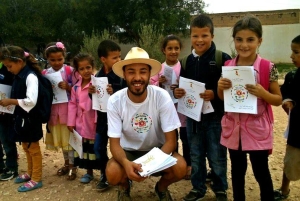Shady Rabhi
One of the hundreds of subjects that the revolution of 2011 in Tunisia helped uncover, is school dropouts among children. A subject, among many that the ancient regime that ruled the country for more than 23 years was mainly the cause of its raising because of its unjust and unconsidered policies.
According to statistics from the ministry of education, between the years of 1980 and 2012, over 100 000 youth have dropped out of school, an unprecedented number in the history of Tunisia, which reflects the failure of its educational system, that knew many unconsidered reforms during the years of Ben Ali’s reign. Based on a survey conducted by the Tunisian Forum for Economic and Social Rights TFESR, school dropout percentage in elementary schools, is about 1%, and reaches up to 10.4% in preparatory schools and nearly 12% in the secondary level. This can be the result of so many difficulties pupils face, going from poverty, poor school conditions and the low quality of the educational system especially when children finish the elementary school without acquiring the necessary and basic skills to reach the next level.
In Kasserine, a city located in the central west of Tunisia, one of the poorest and the most disadvantaged regions of the country, that have suffered decades of mariginalization, the percentage of school dropouts is the highest in the country. This fact rang the alarm for the civil society to mobilize and act against these extremely worrying statistics, and the threat this phenomenon presents to the children of the region. One of the most obvious reasons of the increase of school dropout is the absence of the official role of the state when it comes to the basic educational needs it should provide for the children, like school buses in rural areas where pupils are obliged to walk for more than 8 kilometers to reach school on unpaved and dangerous roads and the lack of cultural activities alongside the school program, which is something reserved only to the pupils of the priviliged regions of the country. Also, a very common reason is that parents in the rural areas oblige children to drop out of school to work with them (mainly in agriculture, the thing that rises an other forgotten subject which is child labour), and in the absence of the official intervention to prevent these cases, this phenomenon continues to grow…
The civil society, along with international NGOs and the Education unions are constantly trying to highlight the gravity of school dropout and its impact on the future of the country as a whole; there have been many projects around this subject to raise awarness about it to public, and to try to put some pressure on the state officials to act against it. I, for example, am currently working with a group of volunteers to produce a documentary by means of which, we are hoping to deliver the message of some children who are hoping for a better reality, and hopefully, a better future.
Shady Rabhi
The contents of this article are the sole responsibility of the author, and can under no circumstances be regarded as reflecting the position of ALDA and the European Union.



Leave A Comment